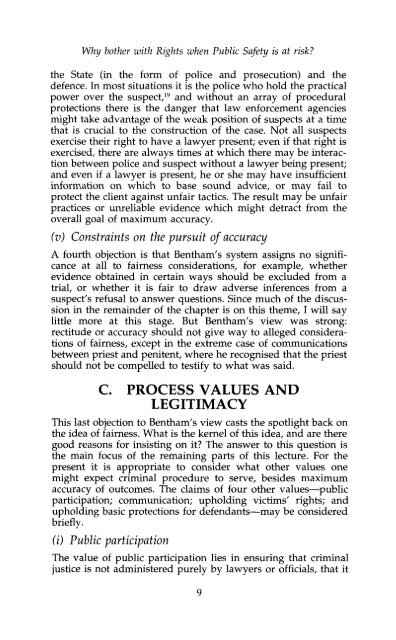Human Rights, Serious Crime and Criminal Procedure - College of ...
Human Rights, Serious Crime and Criminal Procedure - College of ...
Human Rights, Serious Crime and Criminal Procedure - College of ...
- No tags were found...
You also want an ePaper? Increase the reach of your titles
YUMPU automatically turns print PDFs into web optimized ePapers that Google loves.
Why bother with <strong>Rights</strong> when Public Safety is at risk?the State (in the form <strong>of</strong> police <strong>and</strong> prosecution) <strong>and</strong> thedefence. In most situations it is the police who hold the practicalpower over the suspect, 19 <strong>and</strong> without an array <strong>of</strong> proceduralprotections there is the danger that law enforcement agenciesmight take advantage <strong>of</strong> the weak position <strong>of</strong> suspects at a timethat is crucial to the construction <strong>of</strong> the case. Not all suspectsexercise their right to have a lawyer present; even if that right isexercised, there are always times at which there may be interactionbetween police <strong>and</strong> suspect without a lawyer being present;<strong>and</strong> even if a lawyer is present, he or she may have insufficientinformation on which to base sound advice, or may fail toprotect the client against unfair tactics. The result may be unfairpractices or unreliable evidence which might detract from theoverall goal <strong>of</strong> maximum accuracy.(v) Constraints on the pursuit <strong>of</strong> accuracyA fourth objection is that Bentham's system assigns no significanceat all to fairness considerations, for example, whetherevidence obtained in certain ways should be excluded from atrial, or whether it is fair to draw adverse inferences from asuspect's refusal to answer questions. Since much <strong>of</strong> the discussionin the remainder <strong>of</strong> the chapter is on this theme, I will saylittle more at this stage. But Bentham's view was strong:rectitude or accuracy should not give way to alleged considerations<strong>of</strong> fairness, except in the extreme case <strong>of</strong> communicationsbetween priest <strong>and</strong> penitent, where he recognised that the priestshould not be compelled to testify to what was said.C. PROCESS VALUES ANDLEGITIMACYThis last objection to Bentham's view casts the spotlight back onthe idea <strong>of</strong> fairness. What is the kernel <strong>of</strong> this idea, <strong>and</strong> are theregood reasons for insisting on it? The answer to this question isthe main focus <strong>of</strong> the remaining parts <strong>of</strong> this lecture. For thepresent it is appropriate to consider what other values onemight expect criminal procedure to serve, besides maximumaccuracy <strong>of</strong> outcomes. The claims <strong>of</strong> four other values—publicparticipation; communication; upholding victims' rights; <strong>and</strong>upholding basic protections for defendants—may be consideredbriefly.(i) Public participationThe value <strong>of</strong> public participation lies in ensuring that criminaljustice is not administered purely by lawyers or <strong>of</strong>ficials, that it
















